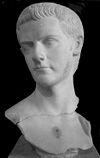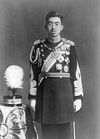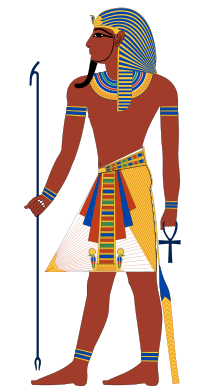- Imperial cult
-
An imperial cult is a form of state religion in which an emperor, or a dynasty of emperors (or rulers of another title), are worshipped as messiahs, demigods or deities. "Cult" here is used to mean "worship", not in the modern pejorative sense. The cult may be one of personality in the case of a newly arisen Euhemerus figure or one of national identity (e.g., Egyptian Pharaoh, Ethiopian Empire or Empire of Japan) or supranational identity in the case of a multi-ethnic state (e.g., Imperial Era China, Roman Empire). A divine king is a monarch who is held in a special religious significance by his subjects, and serves as both head of state and a deity or head religious figure. This system of government combines theocracy with an absolute monarchy.
Contents
Historical
Further information: List of imperial cultsAncient Egypt
Main article: PharaohThe Ancient Egyptian male Pharaohs were believed[clarification needed] to be incarnations of the god Horus, derived by being the son of the sun deity, Hathor (or later, Isis), or the sky deity, Nut.
Ancient China
Main articles: Chinese sovereign and Religion in ChinaIn ancient China,[clarification needed] an emperor was considered the Son of Heaven. The scion and representative of heaven on earth, he was the ruler of all under heaven, the bearer of the Mandate of Heaven, his commands considered sacred edicts. A number of legendary figures preceding the proper imperial era of China also hold the honorific title of emperor, such as the Yellow Emperor and the Jade Emperor.
Ancient Rome
Main article: Imperial cult (ancient Rome) Caligula referred to himself as a god
Caligula referred to himself as a god
Even before the rise of the Caesars, there are traces of a "regal spirituality" in Roman society. In earliest Roman times the king was a spiritual and patrician figure and ranked higher than the flamines (priestly order), while later on in history only a shadow of the primordial condition was left with the sacrificial rex sacrorum linked closely to the plebeian orders.
King Numitor corresponds to the regal-sacred principle in early Roman history. The "founder of Rome" Romulus was heroized into "Quirinus", the "undefeated god", of whom the later Caesars identified with and considered themselves incarnations.
Varro spoke of the initiatory mystery and power of Roman regality (adytum et initia regis), inacessible to the exoteric communality.
In Plutarch's Phyrro, 19.5, the Greek ambassador declared amid the Roman Senate he felt instead like being in the midst of "a whole assembly of Kings".
As the Roman Empire developed as the dictator-prince Julius Caesar left his crucial mark on Roman history, the Imperial cult gradually developed more formally and constituted the worship of the Roman emperor as a god. This practice began at the start of the Empire under Augustus, and became a prominent element of Roman religion.
The cult spread over the whole Empire within a few decades, more strongly in the east than in the west. Emperor Diocletian further reinforced it when he demanded the proskynesis and adopted the adjective sacrum for all things pertaining to the imperial person.
The deification of emperors was gradually abandoned after the emperor Constantine I started supporting Christianity. However, the concept of the imperial person as "sacred" carried over, in a Christianized form, into the Byzantine Empire.
Ancient Japan
 Emperor Hirohito was the last divine Emperor of Japan
Emperor Hirohito was the last divine Emperor of Japan
In ancient Japan, it was customary for every clan to claim descendancy from gods (ujigami), and the royal family or clan tended to define their ancestor as the dominant, or most important kami of the time. Later in history, this was considered common practice by noble families, and the head members of the family, including that of the imperial family, were not seen to be divine. It was not until the Meiji period, that the Japanese Emperor began to be venerated under a system of State Shinto, along with a growing sense of nationalism.
- Arahitogami - the concept of a god who is a human being applied to Emperor Hirohito, up until the end of World War II.
- Ningen-sengen, the declaration with which Emperor Hirohito, on New Year's Day 1946, (formally) declined claims of divinity, keeping with traditional family values as expressed in the Shinto religion.
Tibet
Tibetan Buddhism use the tulku system, an ancient way of finding the reincarnation of a previous deceased lama: they are usually young boys, sometimes of wealthy and influential families and sometimes of peasant families like the current 14th Dalai Lama, that are found and enthroned as the reincarnation of an enlightened person that has already deceased. Every tulku are still called on the title of Rinpoche and is given as much respect as his previous reincarnation. Complying with each and every wish of a child- or adult tulku is not unusual. Tulkus lead responsible lives because of their status as a bodhisattva. While many tulkus are monks, some tulkus choose to lead lay lives with families of their own.[citation needed]
Examples of divine kings in history
See also: sacred kingSome examples of historic leaders who are often considered divine kings are:
- Africa
- Pharaohs of Ancient Egypt
- Ghanas (Kings) of the Empire of Ghana
- Haile Selassie I of Ethiopia was an Ethiopian Orthodox Christian, and did not consider himself divine, but the Rastafari movement in Jamaica saw him as the second coming of Christ.
- The various Obas of the West African realm of Yorubaland, particularly the classical Onis of Ife (e.g: Ogoun) and Alafins of Oyo (e.g: Shango).
- Asia
- Chinese pseudo-Christian leader Hong Xiuquan, leader of the Taiping Rebellion, claimed to be Christ's younger brother, and attempted to establish rule as a divine king.
- Korean Buddhist monk Gung-ye, King of Taebong.
- The Japanese emperor Hirohito up to the end of World War II.
- Javanese Kings during Hindu-Buddhist era (4th century – 15th century AD) such as Sailendra dynasty, Kediri, Singhasari, and Majapahit empire.
- Kings of Khmer Empire, Cambodia.
- Srivijaya emperors.
- The Dalai Lamas of Tibet.
- Americas
- Kings of the Mayan city-states of the Classical period[1]
- Inca Emperors in Pre-Columbian Peru[citation needed]
- Kings or Akua Aliʻi of the Hawaiian Islands before 1839
- Europe
- Many Roman emperors were declared gods by the Roman Senate (generally after their death). (See Imperial cult (ancient Rome))
See also
- Atenism
- Apotheosis
- Cult of personality
- Euhemerism
- God Emperor
Notes
- ^ Sharer & Traxler 2006, p.183.
References
- Sharer, Robert J.; with Loa P. Traxler (2006). The Ancient Maya (6th (fully revised) ed.). Stanford, CA: Stanford University Press. ISBN 0-8047-4817-9. OCLC 57577446.
Further reading
- Dean Nelson (23 June 2006). "Nepal humbles its god-king". The Sunday Times (London). http://www.timesonline.co.uk/article/0,,2089-2281369,00.html.
- Maria Baptist (Spring 1997). "The Rastafari". Buried Cities and Lost Tribes. http://www.mc.maricopa.edu/dept/d10/asb/anthro2003/godkings/rastafari.html.
- Rick Effland (Spring 1997). "Definition of Divine kingship". Buried Cities and Lost Tribes. http://www.mc.maricopa.edu/dept/d10/asb/anthro2003/godkings/divking2.html.
- "The World of God Kings". Buried Cities and Lost Tribes. Spring 1997. http://www.mc.maricopa.edu/dept/d10/asb/anthro2003/godkings/godking2.html.
- H.E. Ameresekere (July 1931). "The Kataragama God: Shrines and Legends". Ceylon Literary Register 1 (7): 289–292. http://kataragama.org/docs/ameresekere.htm.
- F. A. Marglin (1989). Wives of the God-King. The RituaLs of the Devadasis of Puri. New Delhi: Oxford University Press. ISBN 0195617312.
External links
Categories:- Religious behaviour and experience
Wikimedia Foundation. 2010.


